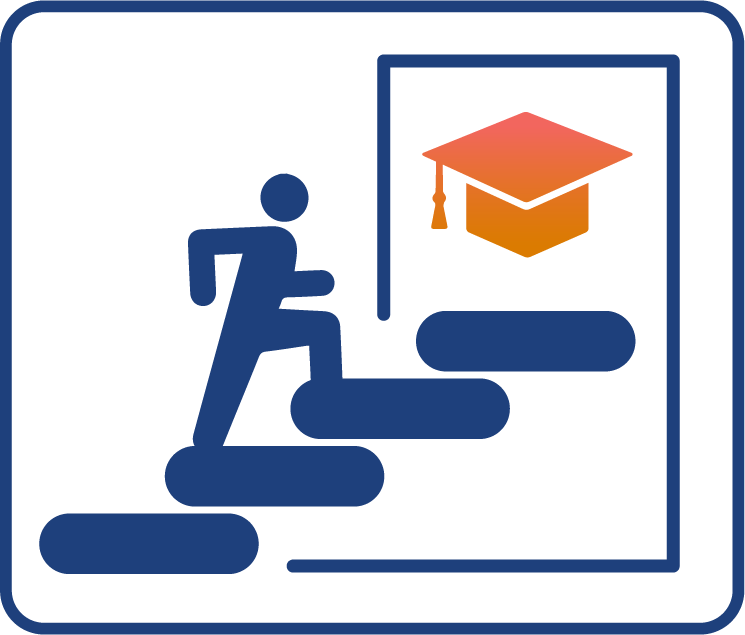100% Online
Complete your Penn State course work at your own pace and 100% online.
Application deadline
Credits and costs
Children's Literature Skills in the Classroom and Beyond
Understand and navigate the diverse perspectives and contexts that shape children's reading experiences.
Demonstrate an understanding of the various theories and genres of literature for children and young adults.
Explain childhood as an idea and teach children's literature as a social project and cultural artifact.
Expand your understanding of issues of race, class, gender, and disability in children's literature.
Course Work to Advance Your Understanding of Children’s Literature
Course Work to Advance Your Understanding of Children’s Literature
Courses can teach you to help children discover the joys of reading by allowing you to:
- study both classic and modern children’s and young adult literature
- learn about and incorporate the use of picturebooks, folklore, and myths
- interpret picturebooks as an active, creative process that is socially, culturally, and historically significant
Required Course (3 credits)
- 3credits
Study of various genres of children's literature, from various critical perspectives. Emphasis on role of literature in children's lives.
Electives (select 12 credits)
Note: Only two of the four elective courses can be at the 400 level.
- 3credits
The study of childhood from cultural, historical, psychological, and philosophical perspectives.
- 3credits
An in-depth study of picturebooks as art objects providing aesthetic experiences and contributing to our aesthetic development in literacy education.
- 3credits
A study of nonfiction literature for children and adolescents with an emphasis on inspiring curiosity and agency.
- 3credits
Examine work by writers of classic fantasies (H. C. Andersen, A. A. Milne, etc.) written for children, as well as the work of some contemporary authors (J. K. Rowling, Philip Pullman, Tomi Adeyemi, Nnedi Okorafor, etc.) and popular comics. We will also look at the role of the imagination in the lives of children and the important ways children may transform their private spaces into spaces of wonder that allow them to flourish and reimagine their possibilities.
- 3credits
Critical study of adolescent literature, its diversity of cultural voices, and designs for its use in secondary school classrooms.
- 3credits
Read, discuss, analyze, and reflect on diverse literature from multicultural and critical multicultural perspectives to demonstrate how such ways of readings not only expand literacies but center issues of social justice.
- 3credits
An in-depth study of myths and folktales shared with children and how these stories are remade across different modes and disseminated today across multiple communities of practices.
- 3credits
Supervised workshop in the craft and techniques of writing picture books, short stories, longer fiction, and nonfiction literature for children.
- 3credits
Addresses the different research approaches for doing research in children's literature. Specifically, it discusses research methods and topics in a wide range of theoretical and practical fields — including psychoanalysis, literacies, genre studies, critical pedagogies, biographical studies, critical race theory, and reader responses — guiding learners on how to conduct original research around any topic of choice. It also addresses research methods for doing research on creative writing.
- Note
Students in the Children's Literature path will take this core course instead of CI 501
- Timing
This course should be taken near the end of your program, but not as your last course
Course Availability
If you're ready to see when your courses will be offered, visit our public LionPATH course search (opens in new window) to start planning ahead.
Start or Advance Your Career

Start or Advance Your Career
You can use the knowledge gained from this program and the support of Penn State career resources to pursue careers in a variety of fields, depending on your goals.
Job Titles Related to This Degree
Your graduate studies in children's literature can lead to an exciting career in various fields, including education, the arts, and publishing. Possible careers for you may include but are not limited to:
- teacher
- school administrator
- professor
- writer
- illustrator
- publisher
Career Services to Set You Up for Success

From the day you're accepted as a student, you can access resources and tools provided by Penn State World Campus Career Services to further your career. These resources are beneficial whether you're searching for a job or advancing in an established career.
- Opportunities to connect with employers
- Career counselor/coach support
- Occupation and salary information
- Internships
- Graduate school resources
Ready to Learn More?
Get the resources you need to make informed decisions about your education. Request information on this program and other programs of interest by completing this form.
Ready to take the next step toward your Penn State graduate certificate?
Costs and Financial Aid
Costs and Financial Aid
Learn about this program's tuition, fees, scholarship opportunities, grants, payment options, and military benefits.
Costs and Financial Aid
Graduate Tuition
Graduate tuition is calculated based on the number of credits for which you register. Tuition is due shortly after each semester begins and rates are assessed every semester of enrollment.
| How many credits do you plan to take per semester? | Cost |
|---|---|
| 11 or fewer | $1,017 per credit |
| 12 or more | $12,203 per semester |
| How many credits do you plan to take per semester? | Cost |
|---|---|
| 11 or fewer | $1,027 per credit |
| 12 or more | $12,325 per semester |
Paying for Your Certificate
Students pursuing a certificate are considered "nondegree," a status that is not eligible for federal student aid, including the Federal Direct Stafford Loan program. A private alternative loan may be an option to consider.
Additionally, Penn State offers many ways to pay for your education, including an installment plan and third-party payments. Penn State World Campus also offers an Employer Reimbursement and Tuition Deferment Plan. Learn more about the options for paying for your education.
Students pursuing a degree and meeting all other eligibility requirements may qualify for financial aid.
Financial Aid and Military Benefits
Some students may qualify for financial aid. Take the time to research financial aid, scholarships, and payment options as you prepare to apply. Military service members, veterans, and their spouses or dependents should explore these potential military education benefits and financial aid opportunities, as well.
To view the detailed list of cost of attendance elements, select “World Campus” as the location on the tuition site.
A Head Start toward a Master’s Degree

A Head Start toward a Master’s Degree
Not only can this program help create opportunities in your career, it can also give you a solid head start toward a full master’s degree.
Degree Program Related to This Certificate
If you are a teacher or librarian who wants to improve your strategies for encouraging students to master their reading skills, this program is for you. Some or all credits earned for this certificate can be applied to the following Penn State World Campus degree program:
Advance your knowledge of curriculum, teaching, learning, teacher education, and educational supervision. This flexible Master of Education (M.Ed.) degree program allows you to choose your area of emphasis, preparing you to succeed in an increasingly diverse education landscape.
Learn more about the Master of Education in Curriculum and InstructionAct 48–Approved
Penn State is an Act 48–approved provider for Pennsylvania educators, so the courses for the Graduate Certificate in Children’s Literature may count toward professional development hours.
Who Should Apply?
Whether you are, or aspire to become, a teacher, librarian, children’s writer, illustrator, or publisher, this online program can give you the skills to transform the lives of your readers, hone your craft, and advance your career goals.
Set Your Own Pace

Set Your Own Pace
Whether you are looking to finish your program as quickly as possible or balance your studies with your busy life, Penn State World Campus can help you achieve your education goals. Many students take one or two courses per semester.
Our online courses typically follow a 12- to 15-week semester cycle, and there are three semesters per year (spring, summer, and fall). If you plan to take a heavy course load, you should expect your course work to be your primary focus and discuss your schedule with your academic adviser.
To Finish Your Certificate in One Year
Take 2 courses each semester
To Finish Your Certificate in Two Years
Take 1 course each semester
Convenient Online Format
This program's convenient online format gives you the flexibility you need to study around your busy schedule. You can skip the lengthy commute without sacrificing the quality of your education and prepare yourself for more rewarding career opportunities without leaving your home.
A Trusted Leader in Online Education

Penn State has a history of more than 100 years of distance education, and World Campus has been a leader in online learning for more than two decades. Our online learning environment offers the same quality education that our students experience on campus.
How to Apply to Penn State

How to Apply to Penn State
Apply by June 30 to start August 26
Application Instructions
Deadlines and Important Dates
Complete your application and submit all required materials by the appropriate deadline. Your deadline will depend on the semester you plan to start your courses.
Fall Deadline
Apply by June 30 to start August 26Spring Deadline
Apply by November 1 to start January 13Summer Deadline
Apply by April 1, 2025, to start May 19, 2025
Steps to Apply
For admission to the Graduate School, an applicant must hold either (1) a baccalaureate degree from a regionally accredited U.S. institution or (2) a tertiary (postsecondary) degree that is deemed comparable to a four-year bachelor's degree from a regionally accredited U.S. institution. This degree must be from an officially recognized degree-granting institution in the country in which it operates.
To enroll in graduate-level courses, or to earn the graduate certificate in children's literature, you must have a baccalaureate degree.
You will need to upload the following as part of your application:
English Proficiency — The language of instruction at Penn State is English. With some exceptions, international applicants must take and submit scores for the Test of English as a Foreign Language (TOEFL) or International English Language Testing System (IELTS). Minimum test scores and exceptions are found in the English Proficiency section on the Graduate School's "Requirements for Graduate Admission" page. Visit the TOEFL website for testing information. Penn State's institutional code is 2660.
To begin the online application, you will need a Penn State account.
Create a New Penn State Account
If you have any problems during this process, contact an admissions counselor at [email protected].
Please note: Former Penn State students may not need to complete the admissions application or create a new Penn State account. Please visit our Returning Students page for instructions.
You can begin your online application at any time. Your progress within the online application system will be saved as you go, allowing you to return at any point as you gather additional information and required materials.
- Choose Enrollment Type: "Certificate Admission"
- Choose "WORLD CAMPUS" as the campus
Checking Your Status
You can check the status of your application by using the same login information established for the online application form.Technical Requirements
Review the technical requirements for this program.5. Complete the application.
Admissions Help
If you have questions about the admissions process, contact an admissions counselor at [email protected].
Contact Us

Contact Us
Have questions or want more information? We're happy to talk.
To learn more about the Graduate Certificate in Children's Literature, please contact:
World Campus Admissions Counselors
Phone: 814-863-5386
Email: [email protected]
Kayla McCloskey
Department of Curriculum and Instruction
The Pennsylvania State University
170 Chambers Building
University Park, PA 16802
Phone: 814-865-2430
Email: [email protected]
Learn from the Best
Learn from the Best
One of the primary reasons Penn State is recognized around the globe as a distinguished university is its faculty. This program is offered in partnership with the Penn State College of Education and as a student, you will enjoy the opportunity to learn from the same instructors who teach traditional, face-to-face classes on Penn State's campuses across Pennsylvania.
Faculty
Elisa Hopkins
- DegreePh.D., Curriculum and Instruction, Penn State
- DegreeM.A., English, Florida State University
- DegreeB.A., English, College of William and Mary
Dr. Elisa Hopkins is an associate teaching professor of education specializing in literature for children and adolescents. She is lead faculty for the Penn State World Campus children's literature program. Her research interests include multicultural poetry, the development of critical consciousness, fairy-tale studies, and nonfiction literature for children and adolescents.
